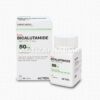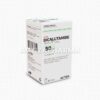Bicalutamide Tablets
| Product/Composition:- | Bicalutamide Tablets |
|---|---|
| Strength:- | 50mg, 150mg |
| Form:- | Tablets |
| Production Capacity:- | 10 Million Tablets/Month |
| Packaging:- | 1 X 10 Tablets / Box |
| Therapeutic use:- | Anti Cancer |
| Package Insert/Leaflet:- | Available upon request |
What is Bicalutamide Tablet?
Bicalutamide Tablet is a medicinal product that is mainly prescribed to treat cancer of the prostate in men.
Bicalutamide is an anti-androgen drug that stops the male hormones from functioning within the body.
These hormones might contribute to the growth of cancer cells.
By stopping their action, Bicalutamide slows down or stops the growth of prostate cancer.
Bicalutamide is taken orally and is commonly used alongside hormone therapy, such as LHRH agonists, or after orchiectomy (surgical removal of the testes).
Description
Bicalutamide is a non-steroidal anti-androgen oral medicine.
It functions by binding to the androgen receptors in the body and blocking the effect of the hormone testosterone on cancer cells.
Bicalutamide does not reduce the amount of testosterone in the body but blocks its action.
It stops cancer cells from growing in the prostate gland.
The medication comes in tablet form and in the dosage strengths of 50 mg and 150 mg, based on the treatment plan.
Uses / Indications
Bicalutamide is mainly used in the treatment of advanced or metastatic prostate cancer.
It is mainly given together with luteinizing hormone-releasing hormone (LHRH) analogues or after removal of the testicles by surgery.
It can also be used for early-stage prostate cancer when patients cannot receive surgery or radiation.
It can also be used in states of excess androgen activity, although this is not common.
Benefits
One of the greatest strengths of Bicalutamide is that it can slow down or stop prostate cancer from growing.
It does this without bringing testosterone levels down too much, which can help reduce some of the physical and emotional side effects of hormone therapy.
It comes in the form of an oral tablet, one per day, which is easy to take.
It also provides relief from such symptoms as painful urination or bone pain caused by cancer spread.
Side Effects
As with all medications, Bicalutamide is capable of producing some side effects.
The majority of people won’t have any serious problems, but they need to be aware of what may happen.
Side effects are very minor when they first happen and usually go away as your body becomes accustomed to them.
But you must always advise your physician if there are any side effects that do take place.
Side effects are divided into common and serious reactions.
Common Side Effects:
Some of the more frequent side effects include hot flushes, breast enlargement or tenderness (gynecomastia), tiredness, and mild nausea.
Reduced sex drive or libido is a symptom for many patients.
Other side effects are weight gain, indigestion, or dry skin.
These are not typically dangerous and are generally controllable without stopping the medication.
Less Common or Serious Side Effects:
In some cases, Bicalutamide may cause liver problems, and in these cases, regular liver function tests are necessary.
Severe but infrequent side effects are jaundice (yellowing of the skin or eyes), a skin rash or swelling (allergic reactions), or bad breathing (when combined with other interstitial lung diseases).
Some laboratory tests may reveal changes in liver enzymes or anaemia.
If you have chest pain or any difficulty breathing that is severe, seek medical help immediately.
How Does It Work?
Bicalutamide works by binding to and occupying the androgen receptors in prostate cancer cells.
The receptors are normally targeted by testosterone and similar hormones, assisting the cancer cells in developing.
When Bicalutamide binds to receptors, testosterone is no longer able to act on the cancer cells.
It stops tumour growth or reduces it.
It is most effective when used together with other therapies for hormone suppression, such as LHRH agonists.
Dosage Guidelines
The usual dose of Bicalutamide is 50 mg once a day at the same time every day, with or without meals.
Sometimes, for example, in early cancer, a dose of 150 mg is employed.
Be sure to take as directed by your physician and do not adjust the dose yourself.
If you miss a dose, skip it and continue with the next dose as directed. Never double the dose.
When Not to Use
Bicalutamide is not suitable for females or children.
The drug is also unsuitable for individuals who are allergic to Bicalutamide or any ingredient in it.
Avoid using this drug in case of severe liver disease, or if the physician has expressly advised against it based on other health risks.
Individuals possessing uncommon inherited disorders like galactose intolerance must also stay away from taking this drug.
Pregnant and breastfeeding females must also avoid the tablet entirely.
Drug Interactions
Other drugs may influence the way Bicalutamide functions.
They are blood thinners like warfarin, certain antifungal medications, and seizure medications.
The effects of the medicine will be reduced or enhanced with combined use, which can be unsafe.
Discuss all your medication with your doctor, including over-the-counter and non-prescription medicines.
You should get your blood checked frequently when taking interacting medicines.
Safety Advice
Always take Bicalutamide as prescribed.
Blood tests must be taken regularly to check your liver function and general response to the drug.
Do not drive or use machinery if you become dizzy or feel excessively tired.
Alcohol should be restricted or avoided altogether.
Do not donate blood when on this drug and for a while after you have stopped it.
Tell your doctor if you notice any side effects, particularly breathing difficulties, skin yellowing, or unusual bleeding.
General Instructions
Store the medicine in a cool and dry place away from sunlight and moisture.
Store the tablets in their original packaging and away from the reach of children and household pets.
Take the medicine at regular intervals without missing doses for maximum effect.
No one should take your medicine, even if they have the same symptoms.
Avoid stopping the medicine without consulting the doctor, as it will lose its potency.
Special Dietary / Lifestyle Tips
No dietary limitation is observed in Bicalutamide, but take a normal diet with plenty of fruits and vegetables.
Try to be as active as you can in order to monitor weight and energy levels.
Some people might experience loss of muscle or weight gain due to body fat, so proper eating and light exercise can be helpful.
Try not to smoke and consume alcohol because it might affect the way your body absorbs medicine or make side effects worse.
Comparison with Other Treatments
Bicalutamide is different from hormone-blocking treatments like LHRH agonists in that it does not decrease the body’s testosterone level.
This could lead to fewer sexual or emotional side effects for some patients.
It is also a tablet, as opposed to injections for some of the other treatments.
In most cases, however, Bicalutamide works best in conjunction with other drugs that suppress hormones, especially in advanced prostate cancer.
Precautions & Warnings
Always inform your doctor of your complete medical history before you start Bicalutamide.
Particular caution is required if you have liver impairment, diabetes, or a heart condition.
The medication can affect blood sugar or liver enzymes, so regular monitoring is vital.
Don’t take the medication if you are a female or if you may become pregnant.
If you are giving this medication to someone else, wear gloves, particularly if you are pregnant.
Can I Take It With Other Medicines?
Most of the time, Bicalutamide may be taken with other medications without issue, but always speak to your doctor first.
Some medicines may interact with how Bicalutamide works or with the side effects.
Your doctor can adjust the dosage or request follow-up visits to assist in protecting you.
Always carry with you a list of the drugs you take, especially when you visit a new doctor or pharmacist.
Can Be Used With
Avoid With
Storage
Store Bicalutamide Tablets at room temperature (15–30°C) in a dry place.
Avoid heat, sunlight, and moisture. Do not freeze or refrigerate.
When not in use, tighten the cap and keep it out of children’s reach.
Do not utilise tablets after the expiration date, and ask your pharmacist how to discard unused medication.





